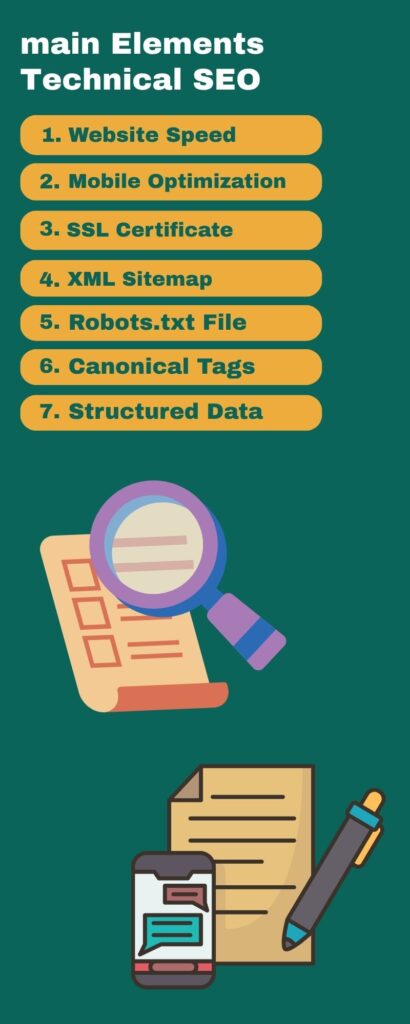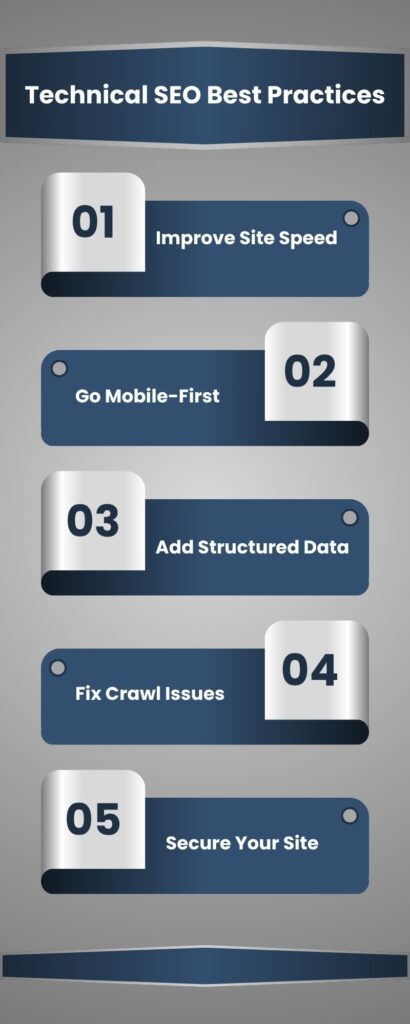Technical SEO 2025: Latest Trends

Table of Contents
As the world of SEO keeps evolving, one thing is clear — technical SEO is now more important than ever.
It’s no longer just about having good content or backlinks. If your website doesn’t work well behind the scenes — slow loading, broken links, not mobile-friendly — Google won’t treat it kindly. That’s where technical SEO comes in.
In this blog, we’ll walk through:
- What technical SEO is
- Why it matters more in 2025
- Key elements you need to check
- Latest trends
- Best practices (in simple steps)
- Specific tips for SaaS and eCommerce websites
- How to find the right technical SEO agencies or experts
Let’s dive in.
What is Technical SEO (In Simple Words)?
Technical SEO refers to everything you do to optimize your website’s infrastructure so that search engines like Google can easily crawl, understand, and index your content.
It’s like cleaning up and organizing your home before guests arrive — if your website structure is clean, fast, and secure, Google loves it!
Why Technical SEO Is a Big Deal in 2025
Search engines are getting smarter — especially with AI and voice search on the rise. They’re not just looking at what your content says, but how it’s delivered.
Here’s why technical SEO matters this year:
- Google Core Updates are focusing heavily on page experience.
- Mobile-first indexing is now standard — if your site isn’t mobile-friendly, you’re losing traffic.
- Page speed and security now affect your rankings directly.
- With SaaS and eCommerce sites booming, structured data and clean code are more important than ever.
So whether you’re a freelance technical SEO expert, part of a technical SEO agency, or even a SEO tech developer, staying updated is crucial.
Main Elements of Technical SEO
Here’s a quick overview of what technical SEO includes:

Technical SEO Tools
| S.No | Tool Name | Official Link |
|---|---|---|
| 1 | Google Search Console | Visit |
| 2 | Screaming Frog SEO Spider | Visit |
| 3 | Ahrefs Site Audit | Visit |
| 4 | SEMrush Site Audit Tool | Visit |
| 5 | Google PageSpeed Insights | Visit |
| 6 | GTmetrix | Visit |
| 7 | Google Lighthouse | Visit |
| 8 | DeepCrawl (Now Lumar) | Visit |
| 9 | Sitebulb | Visit |
| 10 | Bing Webmaster Tools | Visit |
Bonus Tools
| S.No | Tool Name | Official Link |
|---|---|---|
| 1 | Robots.txt Tester (GSC) | Visit |
| 2 | XML Sitemap Generator | Visit |
| 3 | Log File Analyzer (Screaming Frog) | Visit |
| 4 | Chrome DevTools | Visit |
Latest Technical SEO Trends in 2025
Here are some trends to watch this year if you’re serious about SEO growth:
- AI-Powered Crawlers: Google uses AI models to understand your site better — clean structure matters more.
- Core Web Vitals: These are Google’s key speed and performance metrics — optimize for LCP, FID, CLS.
- Server-Side Rendering (SSR): For JavaScript-heavy sites (like React), SSR is now crucial for crawling.
- Edge SEO: Making SEO changes at the CDN level (Cloudflare, Akamai) is growing fast.
Technical SEO Best Practices (Easy Checklist)
Here are some actionable steps to improve your technical SEO right now:

1. Improve Site Speed
- Compress images (use tools like TinyPNG)
- Minify CSS and JS files
- Use lazy loading for images
- Set up a CDN
2. Go Mobile-First
- Use responsive design
- Make sure text and buttons are readable on phones
- Avoid pop-ups that cover the screen
- Test on Google’s Mobile-Friendly Tool
3. Add Structured Data
- Use JSON-LD format
- Apply schema types (Product, FAQ, Breadcrumbs)
- Test with Google’s Rich Results Tool
4. Fix Crawl Issues
- Submit a clean XML sitemap to Google Search Console
- Check Robots.txt to avoid blocking important pages
- Fix 404 errors and broken links
- Use canonical tags to avoid duplicate content
5. Secure Your Site
- Always use HTTPS
- Keep your CMS and plugins updated
- Use security headers where possible
Technical SEO for eCommerce & SaaS
Let’s break it down:
eCommerce Technical SEO
- Use product schema markup for rich snippets
- Avoid duplicate content from filters & categories
- Make sure your site has fast page load times, even with high-resolution images
- Optimize mobile shopping experience
SaaS Technical SEO
- Improve technical documentation (indexable & structured)
- Focus on lead form performance & tracking
- Use schema for features, pricing, and FAQs
- Ensure your pages are fast and interactive
How to Choose the Right Technical SEO Agency or Freelancer
Looking to hire help? Don’t settle for just any technical SEO company. Use this checklist:
- Do they understand your niche (e.g., SaaS, eCommerce)?
- Do they offer a technical audit first?
- Can they show past success or client case studies?
- Are they transparent about their strategy?
Also, check platforms like LinkedIn, Clutch, or even Fiverr if you’re looking for freelance technical SEO experts
Bonus Tips for Developers & Tech Teams
If you’re a SEO tech developer, here’s what to focus on in 2025:
- Use SSR or static site generation for JavaScript-heavy sites
- Monitor crawl budget for large-scale websites
- Implement performance monitoring tools (like GTmetrix or Lighthouse)
- Clean up CSS and remove unused styles to boost page speed
Final Thoughts
Technical SEO may sound scary, but with the right strategy and a bit of help, it becomes manageable — and even fun!
Whether you’re running a SaaS startup, an eCommerce store, or working as part of a tech SEO team, the technical side of SEO can give your site a serious edge.
Need help? Don’t hesitate to reach out to technical SEO companies or freelancers who understand your business goals.

I’m Mehwish Patel (MCS), a tech blogger sharing useful guides on web development, Python projects, and digital tools to help you grow online.
